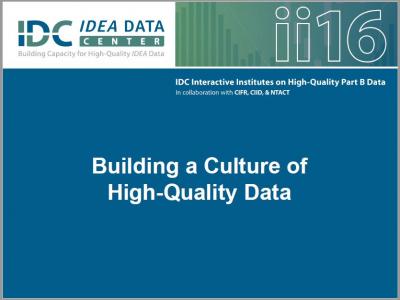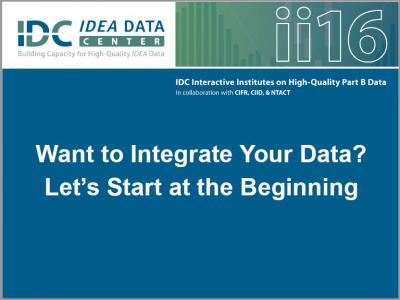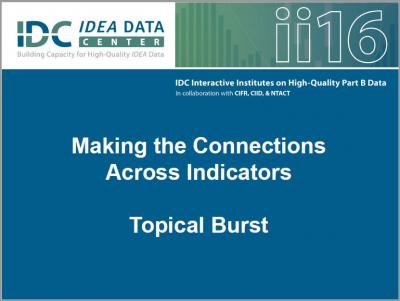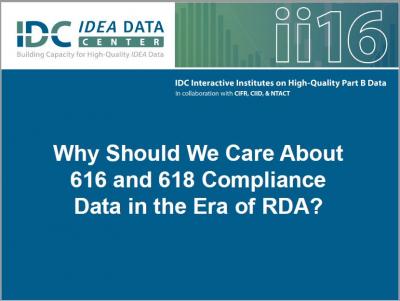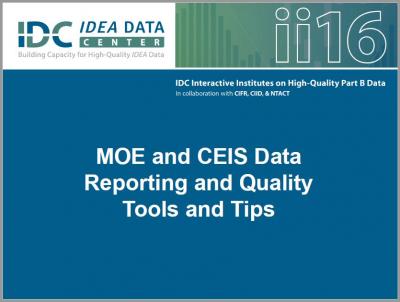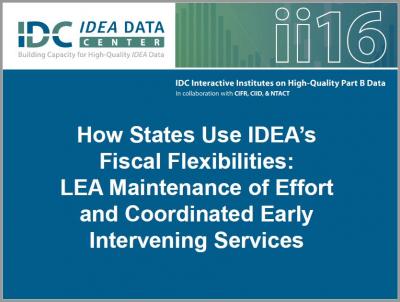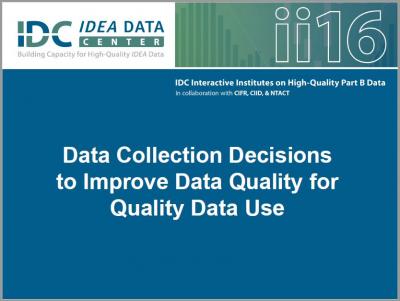Site Search
Results 1 - 7 of 25
Format: Presentations
Building a Culture of High-Quality DataPanel participants included staff from the DQC and the Georgia Department of Education. DQC staff discussed the role of education data and the opportunity to go beyond compliance, the need for focusing on policy priorities, and new opportunities the Every Student Succeeds Act presents. Georgia Department of Education staff shared their story about how the state has built a culture of data use from state-level infrastructure development to getting the data into the hands of teachers who are using the data to have a positive impact on improving student results.
Format: Presentations
Want to Integrate Your Data? Let’s Start at the BeginningStaff beginning a data integration effort within their state must first establish a clear purpose for integration. Focusing on the first step of integration during this session, CIID staff helped participants refine the purpose and use case for integrating their data. Also, participants used the CIID Data Integration Toolkit to develop a plan to ensure key stakeholder understanding of the purpose for, and improve their support of, data integration efforts in the state.
Format: Presentations
Making the Connections Across IndicatorsPresenters revisited the connections (improvement strategies, data sets, program evaluation) across several of the IDEA Part B Indicators–the gist of RDA–with a particular focus on the indicators most closely related to secondary students.
Format: Presentations
Why Should We Care About 616 and 618 Compliance Data in the Era of RDA?Some have suggested that RDA and the shift from a focus on compliance to a focus on improving results for children with disabilities appears to have relegated compliance data to the back of the bus. Presenters from the U.S. Department of Education, OSEP highlighted the crucial role that section 616 and section 618 compliance data still play in RDA. Additionally, presenters shared ideas on how these data can be used not only for compliance but also to improve results for children and students with disabilities.
Format: Presentations
MOE and CEIS Data Reporting and Quality Tools and TipsIDC and CIFR staff presented an overview of tools available to states and LEAs around LEA MOE and CEIS requirements and data quality. They also presented information on considerations states and LEAs need to keep in mind in relation to the MOE and CEIS requirements and data quality. One state presented information about the policies, procedures, practices, and tools/ templates it has in place to ensure LEAs meet the LEA MOE and CEIS requirements and improve data quality. The state staff also discussed their work with CIFR around the LEA MOE calculator.
Format: Presentations
How States Use IDEA's Fiscal Flexibilities: LEA Maintenance of Effort and Coordinated Early Intervening ServicesThe presentation provided an overview of LEA MOE and CEIS requirements, including the four new data collection elements implemented by OSEP. Presenters also provided information about areas of IDEA fiscal flexibilities that are available to states and discussed the fact that not many LEAs take advantage of these flexibilities. The flexibilities relate to the MOE reduction, CEIS, and their possible correlation to the SSIP.
Format: Presentations
Data Collection Decisions to Improve Data Quality for Quality Data UseThis presentation provided an overview of the challenges of data collection for IDEA Part B Indicator 14 and identified some successful efforts to overcome challenges such as representativeness and response rates. Additionally, presenters shared one state's effort to improve the quality of their student post-school outcome data to increase confidence in programmatic decisions that could be made from those data.

